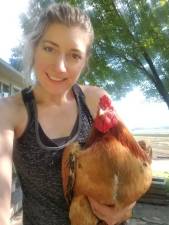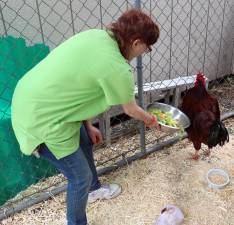Residents cry fowl
After the Town of Warwick proposes a rooster ban, an ambassador bird hits the streets.
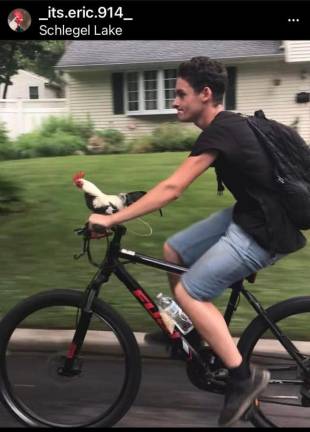
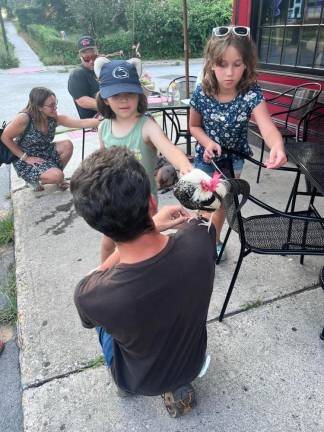

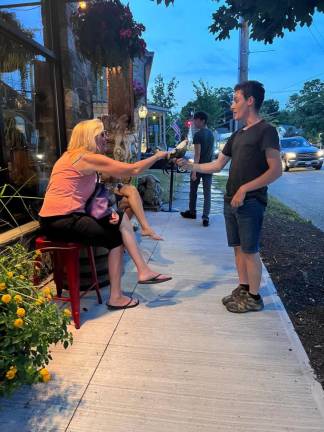
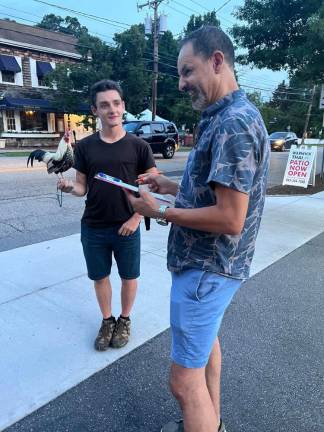
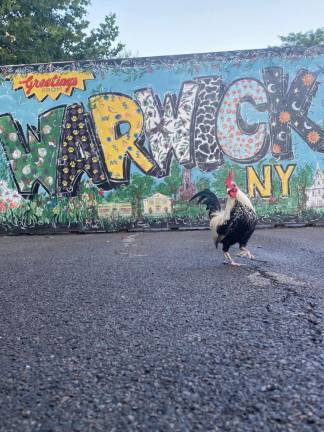

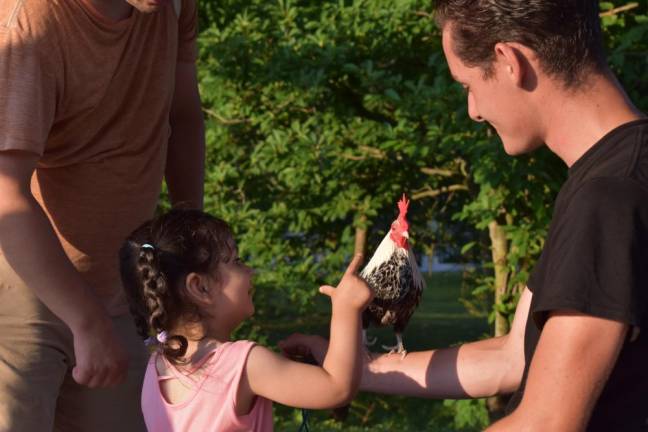
When he heard about the Town of Warwick’s proposed ban on roosters, 20-year-old Johnny Gidney collected his miniature rooster, Eric, and hit the streets to collect signatures opposing it. It was almost as if the pair had spent the last few years in training for this moment.
The Village of Warwick has long prohibited keeping chickens, but in the town, you’re allowed 10 fowl regardless of the size of your property – and plenty of people keep more. But tucked deep into the agenda of a July 14 Warwick Town Board public hearing was an introductory local law that specifically excluded roosters from residential lots in town.
“Yeah, we were getting a fair amount of complaints over the past couple years – roosters being annoying to neighbors in close proximity,” said Warwick Supervisor Michael Sweeton. “It was primarily on smaller lots, right? It didn’t seem like a big deal. So we put it on with some other changes.”
For families like the Gidneys, though, the idea of getting rid of their two roosters was anathema, in direct contradiction to the way of life that attracted them here. “Warwick is rural. It’s one of the reasons we moved here, and bought outside the village,” said Laura Gidney, who homeschooled her three kids: twins Johnny and Maggie, 20, and brother Zack, 15. The siblings grew up with chickens on their 1/3-acre property in the town of Warwick, where the family has lived since 1998.
Cleaning the coop and gathering eggs instilled a sense of responsibility in her kids, said Laura. The interaction also fostered a love of wildlife, she said, one that bloomed into a guiding passion for Johnny, who, the morning after we met up, was on his way to a wildlife photography seminar upstate to which he’d been awarded a scholarship.
“Chickens have been the center axis that everything’s been turning on,” said Johnny.
The Gidneys didn’t make the first town board meeting because, like most people, they had no idea change was afoot, but have cleared their schedule for the next one on Aug. 18. “It was almost like it was going to be done quietly,” said Laura.
There was nothing quiet about the response to the proposed rooster ban, however. Based on the outpouring of indignation at the July 14 public hearing, the board withdrew the proposed change, instead forming a committee to look at the issue. The committee will include chicken keepers who spoke out against the ban, said Sweeton.
“We’ll get a cross-section of people and let ‘em have at it, no time frame, no preconceived notions, just discuss the issue, you know? How do you get to enjoy your property and not make it impossible for someone else to, right?” For now, the town will continue to deal with the occasional noise complaints as they come in, he said. “We’re probably the most farm friendly community around, you know, so we kind of get it, but when you live in a neighborhood, on a half-acre lot, does it make sense on a small lot to have this? Maybe not. But let’s hear it out.”
One possible solution, said Sweeton, would be to grandfather in everyone who has a rooster on whatever lot they have, and then not permit them on small lots going forward, he said.
“But I don’t know if that’s the answer,” he said. “That’s what, hopefully, the committee can come up with some thoughts about.”
The Gidneys, meanwhile, are just gearing up for their first foray into activism. They met this reporter at Stanley-Deming Park on July 22, where they had a clipboard with petitions set up by the entrance. Perched on Johnny’s arm was Eric, who occasionally interjected a call into the conversation, which Johnny would translate: dog, car, bird. Johnny fed him treats from a baggie as we talked, and once, Maggie poured a tiny bit of water into the cap of a bottle for Eric to dip his beak.
The making of the “chicken man”
Eric was Johnny’s quarantine hobby. He used the lockdown to train the family’s Old English Game Bantam – one of the world’s tiniest chicken breeds – to ride around town on his bicycle handlebars, stopping for ice cream when a passersby offered to treat them. On the bike, Johnny kept Eric loosely tethered, so that he could jump onto Johnny’s arm or shoulder if, say, a dog attacked, but could not fly away.
Finding Eric to be extraordinarily docile, Johnny had gone further, exposing him to the noise of trains and trucks, and holding him upside down and getting right up in his face like a kid might do.
“The other two lashed out at me,” said Johnny, who’d accidentally gotten six roosters at Tractor Supply in Chester at the beginning of the pandemic, intending to get hens. He re-homed the other roosters and focused his attention on Eric. “Him, he never even lifted a hackle feather.”
Johnny, who had a previous job working with falcons, felt that Eric had the potential to be an ambassador, showing another side of the bird often maligned as a barnyard bully. “He’s good with babies on up,” said Johnny. “Like everything, the amount of time you put in is usually what you get back.”
Time spent with Eric is not all work, however. “At night he gets increasingly more affectionate,” said Johnny. “He likes to have the feathers on his belly rubbed.”
While visiting his grandmother in the Paramus, NJ, area, Johnny became such a regular sight on his bike, with Eric perched on the handlebars, that “chicken man” ended up as an item on a neighborhood scavenger hunt. Johnny eventually realized this when kids kept running up to him with a piece of paper in hand, then running away.
At his friends’ prodding, Johnny made Eric his own Instagram account (its.eric.914). The rooster quickly gained twice as many followers as Johnny has on his own wildlife photography account. Johnny’s video of Eric flying through falling snow in slow motion, accompanied by the Game of Thrones theme song, went viral on TikTok.
It was all fun and games until the specter of a rooster ban turned Eric’s ambassadorship into a more urgent role. By the end of their second night canvassing, with Eric mixing and mingling on the streets of downtown Warwick, the Gidneys had collected over 200 signatures opposing the ban.
“I couldn’t have found a better bird,” said Johnny, for this moment.
Crowing roosters and disgruntled neighbors
Noise is the crux of the issue with roosters, and not only in Warwick. A rooster’s crow – which famously begins at the crack of dawn – lasts just 1 to 2 seconds, but averages more than 130 decibels at point-blank range. That’s about as loud as standing 50 feet from a jet as it takes off, according to the journal Science. From Greenwich, Connecticut, to Bayonne, Fairlawn and Middle Township, NJ, municipalities are grappling with the confluence of two growing trends: crowing roosters and disgruntled neighbors.
“Listen, people are on edge for all sorts of reasons,” said Sweeton. “So the neighbor who was screaming and yelling, ‘You gotta do something, You gotta do something,’ probably prompted us to think about this. Normally I’m not somebody who rushes into something without doing a lot of work on it, and to be honest I did not anticipate some of the issues that people brought up.”
Arguing against the ban, residents have invoked their right to perpetuate their own egg-laying flock in a time of increased food insecurity. Others have pointed out the double standard regarding noise when no one is cracking down on firecrackers, ATVs, souped-up car engines, lawnmowers, leaf blowers, back-up truck signals, loud car radios, barking dogs – or guinea hens for that matter, an even louder and increasingly popular breed of fowl. No one at the July public hearing argued in favor of the rooster ban.
“People want food, but they want to ban the animals and farms that bring us food, it is absurd!” said Martin Filipowski of Warwick, who works in data management technology. Filipowski signed the petition opposing the ban, though he doesn’t keep chickens himself. “While I understand that some folks want peace and quiet, banning roosters... won’t make that happen. There will be something else that makes noise, owls hooting all night long, foxes or coyotes calling at night, frogs, cows mooing. How about the dog that barks all night?”
The Gidneys have never had a neighbor complain about their flock, said Laura, and neighborhood kids come over to visit the chickens. Their two roosters – Eric and a 12-year-old living out his retirement – only crow about 15 times a day, she said.
“Of all of the things going on in the world, roosters in Warwick right now are the problem?” she said. “What am I supposed to do, to say to my son? Your pet that you have trained, that you love – kill it? I couldn’t do that to my son.”
Johnny, who likes to plan for all eventualities, has looked into the idea of making Eric a therapy animal, to help his odds of finding a new home if he has to go. He’s heard of a miniature horse being a therapy animal, so why not a tiny rooster?
If, on the other hand, the Gidneys are allowed to keep Eric, Johnny plans to do something he’s never successfully done before. “Eventually I’m going to get a hen or two and breed him,” he said. “Keep his little legacy going if I can.”

